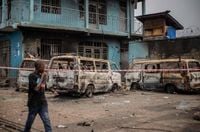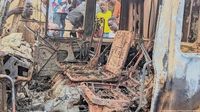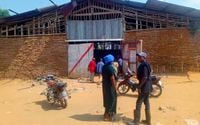At least 43 people, including nine children, were brutally killed in an overnight attack on a Catholic church in Komanda, eastern Democratic Republic of Congo (DRC), on July 27, 2025. The assault, carried out by militants from the Allied Democratic Forces (ADF), an Islamist group linked to the Islamic State (IS), targeted worshippers gathered for a youth retreat during a night prayer vigil. The attack left the local community devastated and drew widespread condemnation from international and religious leaders alike.
The militants stormed the Caritas hall of the Blessed Marie-Clémentine Anuarite Nengapeta Catholic Church, opening fire and using machetes against the faithful. Father Marcelo Oliveira, a Comboni missionary with years of experience in the Congo, described the horror: "The attack occurred at around 1 o’clock in the morning. The rebels entered the church and murdered a large number of children, both inside the church building and in the compound." The assailants did not stop at the church; they looted nearby homes, shops, and banks and attacked displaced persons sheltering at the town hospital.
Komanda, located about 46 miles southwest of Bunia—the provincial capital of Ituri—is a commercial hub linking several provinces, making it a strategic target for militias. Father Justin Zanamuzi, vicar general of the Diocese of Bunia, explained that the victims had gathered to celebrate the parish church's jubilee and were waiting for Sunday service when the attack occurred. "As the church, we condemn this attack in the greatest terms possible. We feel the pain of this attack," he said.
The ADF, the group responsible for the massacre, originated in Uganda in 1995, initially accusing the Ugandan government of persecuting Muslims. Over time, the group shifted its base to the mountainous border region between Uganda and Congo, where it has become notorious for recruiting child soldiers and perpetrating brutal acts including maiming, killing, and sexual violence. In 2019, the ADF pledged allegiance to the Islamic State, becoming part of IS's Central African Province, which also includes factions in Mozambique.
Despite a joint military offensive by Congolese and Ugandan forces, the group has intensified its violence. Lt. Jules Ngongo, spokesman for the Congolese army in Ituri province, said the attack was a calculated attempt to divert attention from ongoing military operations against the ADF. "These terrorists have decided to take revenge on defenseless peaceful populations to spread terror," he stated, urging locals to remain vigilant and report suspicious activity.
The United Nations peacekeeping mission in Congo, MONUSCO, confirmed the death toll of 43, which included 19 women, 15 men, and nine children. Vivian van de Perre, MONUSCO's deputy special representative, condemned the attack as "heinous," emphasizing that "these targeted attacks against defenseless civilians, particularly in places of worship, are not only appalling but also in violation of all human rights standards and international law." The UN mission has repeatedly expressed concern over a resurgence of violence in the region, noting that earlier in July, ADF attacks had resulted in 47 deaths.
The attack in Komanda came just days after another militia, the Cooperative for the Development of the Congo (CODECO), desecrated the St. John of Capistrano church in Lopa, Ituri province. That assault involved the violation of the tabernacle, spilling of consecrated Hosts, vandalism of the Marian shrine, and destruction of sacred objects. Bishop Dieudonné Uringi Uuci of Bunia condemned the desecration, highlighting CODECO's long history of atrocities against Church facilities and personnel since 2017.
The ongoing violence in Ituri, North Kivu, and South Kivu provinces is part of a deadly cycle fueled by complex regional politics, ethnic rivalries, and competition for control over the area's rich mineral resources, including coltan, cobalt, gold, and diamonds. Eastern Congo remains one of the world's most dangerous regions, with nearly 130 armed groups operating, many focused on exploiting these resources.
In the wake of the Komanda attack, Pope Leo XIV expressed profound sorrow in a telegram sent by Cardinal Pietro Parolin, Vatican's secretary of state, to Archbishop Fulgence Muteba Mugalu, president of the Congolese Bishops’ Conference. The pope joined "the mourning of the families and the Christian community," offering prayers and closeness to those affected. He urged that "the blood of these martyrs may be a seed of peace, reconciliation, brotherhood and love for all the Congolese people." The telegram called for urgent efforts toward the integral human development of the wounded population in the region.
The Orthodox Public Affairs Committee, a global advocacy group for Orthodox Christians, also condemned the massacre, describing it as "not a battle but a massacre of faithful in the house of God." The group highlighted the attackers' use of guns and machetes, setting the church ablaze and slaughtering worshippers during their vigil.
The ADF's continued rampage underscores the fragile security situation in eastern Congo, despite international and regional efforts to stabilize the area. The Congolese government, supported by Ugandan troops since 2021, has intensified military operations against the group, but the militants persist in their violent campaign.
As the community of Komanda laid the victims to rest in a mass grave following a funeral Mass on July 28, 2025, the enormity of the tragedy was palpable. The attack not only shattered lives but also struck at the heart of a community seeking solace in faith. It serves as a grim reminder of the ongoing conflict and the urgent need for peace and security in this mineral-rich but volatile region.
With the death toll mounting and attacks on places of worship becoming increasingly frequent, the international community faces mounting pressure to address the root causes of violence in eastern Congo. Until peace is achieved, communities like Komanda remain vulnerable to the horrors inflicted by extremist militias determined to spread terror and instability.



